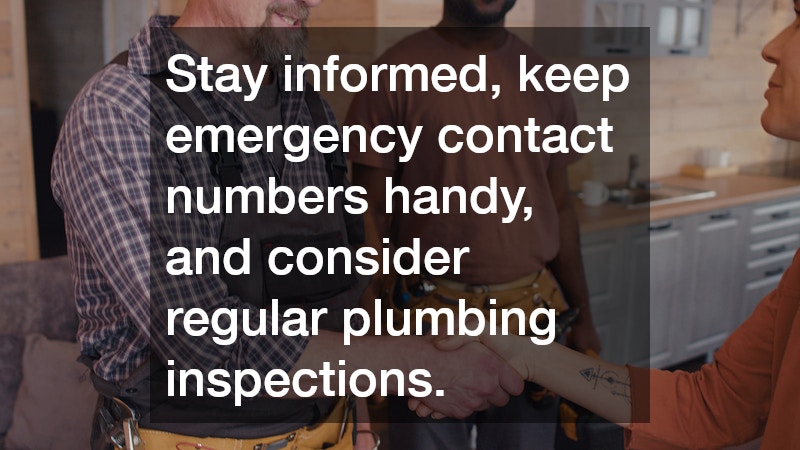X Signs You Need an Emergency Plumber Now
Plumbing issues can escalate rapidly, causing significant damage and inconvenience. Recognizing the signs that you need an emergency plumber can save you time, money, and stress. This article will guide you through the key indicators that it’s time to call in a professional without delay.
What are the Common Signs of a Plumbing Emergency?
1. Water Leaks and Flooding
Unanticipated water leaks can quickly lead to flooding, causing extensive damage to your home’s structure and possessions. In many cases, leaks occur in places where they remain undetected for a long time, escalating the risk of severe water damage.
Even a small, continuous leak can increase water bills dramatically and foster mold growth. It’s crucial to monitor your water usage, as an unexplained spike may indicate a hidden leak needing immediate professional attention.
Furthermore, when water leaks reach electrical components, they pose dangerous safety hazards, including the risk of electrocution. A trained emergency plumber can identify and resolve the source of the leak efficiently, mitigating further damage.
2. Persistent Clogs
When plungers and over-the-counter solutions fail, persistent clogs can indicate a larger issue that requires immediate professional attention. Blockages may reside deep within the plumbing system, obstructing water flow and causing backups and overflows.
Clogs often result from the accumulation of debris and foreign objects over time, necessitating a plumber’s specialized tools for proper removal. Moreover, continuous ignoring of clogging issues can lead to cracked pipes and potential structural damage.
It’s essential to routinely clean drains and avoid flushing non-dissolvable items to prevent severe clogs. Quick response to signs of obstruction prevents minor issues from escalating into full-fledged emergencies.
How Can Plumbing Emergencies Be Prevented?
1. Regular Maintenance Checks
Conducting routine maintenance checks can help identify potential problems before they escalate into emergencies. Scheduled inspections by a professional plumber can reveal weaknesses or aging components in your plumbing system.
Regular maintenance can significantly prolong the lifespan of your plumbing infrastructure and preserve its efficiency. During these checks, plumbers can also provide valuable tips for homeowners on how to maintain their plumbing systems properly.
Moreover, preventive maintenance identifies minor issues, facilitating inexpensive fixes before they morph into costly emergencies. It’s a proactive approach to ensure the long-term health and functionality of your home’s plumbing.
2. Immediate Response to Early Signs
Addressing early warning signs like slow drainage or unusual noises can prevent minor issues from turning into emergencies. These signs often indicate underlying problems that, if left unresolved, could result in significant disruptions.
Quick action at the first hint of trouble not only saves money but also minimizes inconvenience and damage. Homeowners can maintain a checklist of common issues to look out for, enabling a timely response to potential emergencies.
Prompt attention to early signs shows a commitment to maintaining a functional and stress-free home environment. Having a reliable plumber’s contact information on hand ensures rapid intervention when needed.
What Questions Should I Ask an Emergency Plumber?
1. Licensing and Experience
Verify the plumber’s credentials and experience to ensure they are equipped to handle emergencies efficiently. Real professionals are not only licensed but also have a wealth of experience in tackling a variety of plumbing issues.
Asking about their past experiences with similar problems can assure their capability. It’s also beneficial to inquire about any specialized training or certifications they might possess.
Building trust with your emergency plumber requires transparency regarding their skills and track record. Finding a dependable plumber means having peace of mind knowing your plumbing issues are managed by capable hands.
2. Estimated Costs and Timeframes
Inquire about the expected costs and timeframes for resolving the emergency to plan accordingly and avoid hidden charges. Understanding the financial aspect helps prepare and budget for any necessary repairs or replacements.
Request a detailed breakdown of the costs involved in not only addressing the current issue but also any potential future maintenance. An experienced plumber should provide an estimated timeline for the completion of the work involved.
Having clear communication regarding costs and timeframes prevents misunderstandings and ensures a smoother process. This proactive approach allows homeowners to address plumbing emergencies with confidence and preparedness.
Be Prepared and Stay Proactive
Identifying the signs of a plumbing emergency and knowing how to respond promptly can protect your home and your peace of mind. By understanding common signs, preventive measures, and the right questions to ask, you can be better prepared to handle plumbing crises effectively. Acting quickly can minimise damage, reduce costly repairs, and prevent long-term structural issues. Whether it’s a burst pipe, a blocked drain, or a hidden leak, early detection and immediate action are key. Stay informed, keep emergency contact numbers handy, and consider regular plumbing inspections to stay ahead of potential problems. A proactive approach keeps your plumbing system—and your household—running smoothly.

